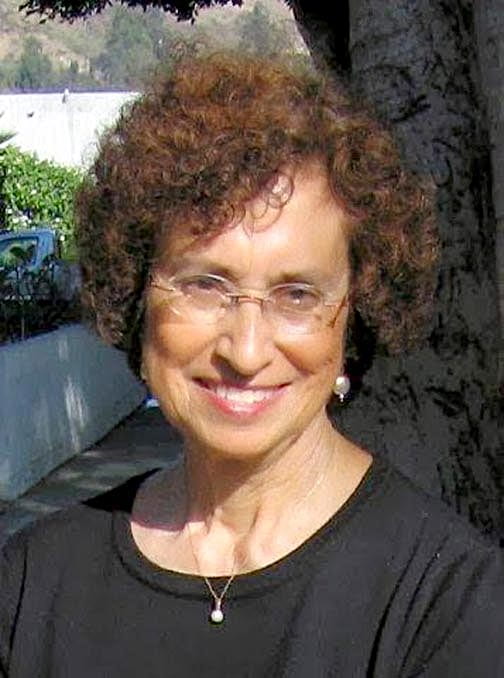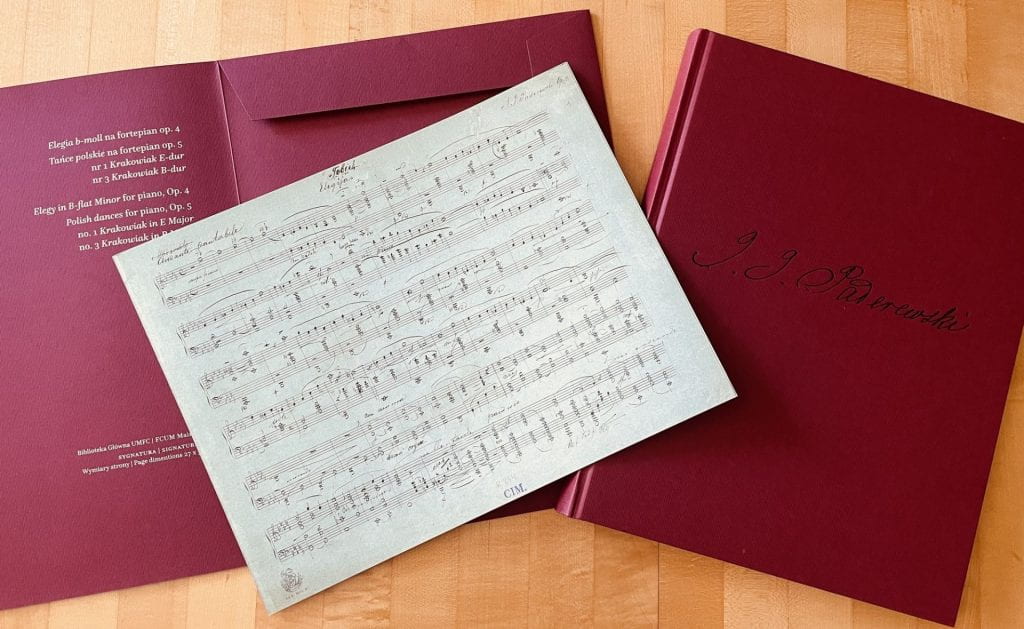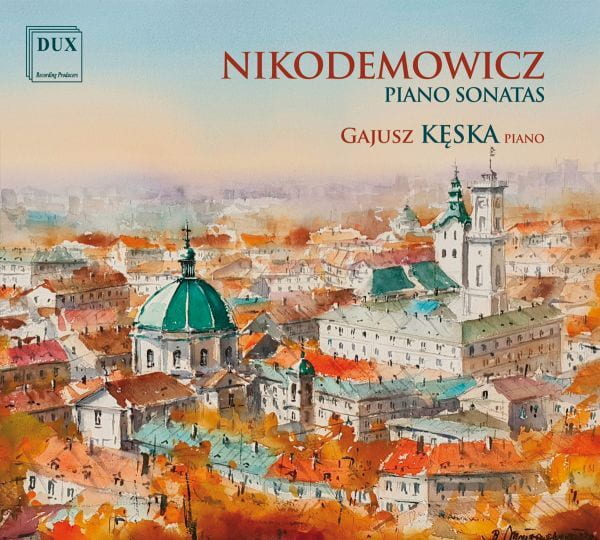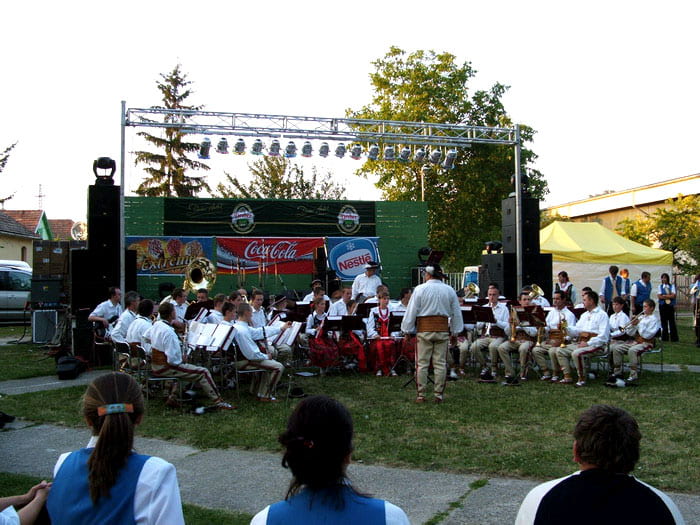Christmas in July!
Amazingly enough, this rather overused turn of phrase in this particular instance actually correctly describes the shower of amazing gifts and donations that the Polish Music Center received throughout the month of July.
The first and historically most significant among them is a tranche of correspondence between Nancy Fierro, an LA-based pianist and champion of women composers, and Wanda Bacewicz, Nancy’s close friend in Poland and sister of the famous violinist and composer, Grażyna Bacewicz. Nancy Fierro’s correspondence with Wanda Bacewicz covers the years 1978-1993 and includes six handwritten and typed letters as well as two postcards in English, all sent by Wanda Bacewicz to Ms. Fierro in Los Angeles. (see photo above)
In addition, there is a three-page typed commentary (in Polish) written to accompany the recording of Grażyna Bacewicz’s violin and piano music that was issued by the Polskie Nagrania company, probably in the 1970s or early 1980s. This fascinating document, with numerous handwritten additions and corrections, contains much biographical information about Grażyna Bacewicz as well as some analysis, background and details regarding world premieres of Bacewicz’s Fourth Sonata for Violin and Piano (1949), Fifth Sonata for Violin and Piano (1951), and Second Sonata for Solo Violin (1958).

A short note from Ms. Fierro included with this donation provides additional contextual information as well as comments on the contents these letters. Since Nancy Fierro was so close to the Bacewicz family, these observations are of great importance as well. As with her previous donations, this assembly of letters will be added to the already significant collection of Grażyna Bacewicz’s manuscripts, sketches, correspondence and other memorabilia in the PMC.
A Stack of NIFC CDs
After a July 5 visit with Dr. Artur Szklener, director of the Fryderyk Chopin Institute [NIFC] in Warsaw, the Polish Music Center’s sound library received several new and valuable recordings recently issued by NIFC. A substantial portion of this generous gift consists of Stanisław Moniuszko’s operas, including four albums featuring: Halka (the Italian version), Hrabina [The Countess], Flis [The Raftsman], and Verbum nobile in performances by the Europa Galante Ensemble directed by Fabio Biondi. Another album featuring Moniuszko’s Straszny dwór [The Haunted Manor] is presented by the Orchestra of the 18th Century under the leadership of Grzegorz Nowak. All five recordings are beautifully produced as one- or two-CD albums with extensive program notes and complete libretti in several languages.

Dr. Szklener’s gift also includes an album of songs for voice and piano by Moniuszko, Ignacy Jan Paderewski and Henri Duparc with tenor Christoph Prégardien and pianist Christoph Schnackertz, a disc of Paderewski’s solo piano works (Sonata, Op. 21, and selections from shorter works Op. 14 and Op. 16) in performance by Kevin Kenner on Paderewski’s historic 1925 Steinway grand, as well as Paderewski’s monumental “Polonia” Symphony, Op. 24 recorded by the Royal Philharmonic Orchestra led by Grzegorz Nowak.
Finally, two more unusual recordings from NIFC will enrich our library collection. The first is a CD of early romantic piano music by Franciszek Lessel, Joseph Haydn, Jan Václav Hugo Vořišek, Ludwig van Beethoven and Freyderyk Chopin performed by Tomasz Ritter on a copy of the 1819 Graf pianoforte, and the second is a fascinating take on Poland’s iconic composer on a disc Chopin and Flamenco performed by the Paco Peña Flamenco Company.
More Gifts from Warsaw
Wiesław Dąbrowski, head of the Ave Arte Foundation and the founder of the Paderewski Festival in Warsaw, recently donated to the PMC a rare hardcover clothbound publication first issued in 2018 by the Fryderyk Chopin Music University in Warsaw. This attractive and elegantly produced set contains facsimiles of several of Paderewski’s manuscripts held in the Chopin Music University’s library.

The larger, hardbound volume of this set opens with the introductory notes by Poland’s President and the Chopin University’s Rector, which are followed by articles by Zofia Olszewska-Bajera (on Paderewski’s portrait by Leon Kaufmann) and Mieczysława Demska-Trębacz (“Ignacy Jan Paderewski: His Life, His Music, His Work”). The remaining 130 pages of this volume are devoted to beautifully reproduced manuscripts of the following works:
▪ Romance in A major for Violin and Piano, Op. 7
▪ Mazurka for Piano, Op. 9 no. 4
▪ Krakowiak for Piano, Op. 9 no. 5
▪ Polonaise for Piano, Op. 9 no. 6
▪ Danse polonaise (Krakowiak) for Violin and Piano, Op. 9 no. 5 (Paderewski’s arrangement of the Op. 9 solo piano work)
▪ Tatra Album for Piano Four-hands, Op. 12
▪ Cadenza to Beethoven’s Piano Concerto, Op. 37 (first movement)
▪ Dans la forêt, for voice and piano to text by Théophile Gautier
▪ Variations and Fugue in F major for String Quartet (score and viola and cello parts)
▪ Four Songs for Voice and Piano to texts by Adam Asnyk, Op. 7 nos. 1, 2, 3 and 4
▪ I won’t pluck you [Nie będę cię rwała] for voice and piano, Op. 7a
A small folio attached to this publication contains reproductions of three of Paderewski’s early solo piano works, including Elegy, Op. 4, as well as Krakowiaks Op. 5 no. 1 and Op. 5 no. 3. This rare album was issued in conjunction with the centennial celebrations of Poland’s independence in 2018, which also commemorated Paderewski’s important contributions to the regaining of Polish statehood after World War I. The bilingual Polish and English texts make it extremely attractive to any student and scholar interested in exploring Paderewski’s catalogue of piano and chamber music directly from the source material.
Rarely Heard Polish Music Recordings
Another friend of the Polish Music Center, pianist Gajusz Kęska, a noted recitalist and chamber musicians (as well as professor at Kraków Music Academy and the Chopin Music School in Kraków), presented us with two of his latest recordings issued on the DUX label. The first disc (DUX 1896) features three solo piano sonatas by Andrzej Nikodemowicz, a relatively little-known Polish composer who was born in Lwów (now Lviv in Ukraine) in 1925 and died in Lublin in 2017. A gifted pianist and a romantic at heart, Nikodemowicz’s compositions were inspired by Chopin and Szymanowski as well as by Scriabin, Rachmaninov and mid-twentieth century modernism. In spite of such influences, Nikodemowicz managed to create a particularly interesting and individual musical language.

In addition to about a hundred shorter piano works and seven piano concertos, Nikodemowicz also wrote a great deal of cantatas and vocal music to religious texts. This premiere recording by Maestro Kęska shows him as a fine virtuoso with an impressive command of a decidedly demanding material found in Nikodemowicz’s Sonatas Op. 7 (1947), Op. 16 (1951), and Op. 22 (1958) featured on this recording.
The second CD donated to us by Gajusz Kęska features works for violin and piano by two Lublin-linked composers, Henryk Wieniawski and Andrzej Nikodemowicz. This DUX 1895 release opens with four well-known Wieniawski gems, Kujawiak in A minor, Obertas in G major Op. 19 no. 1, Polish Song in G minor, Op. 12 no. 2 and Dudziarz in D major, Op. 19 no. 2. The rest of this CD is devoted to Nikodemowicz’s evocative Five Lullabies, Op. 94, a three movement Sonata, Op. 10, as well as Nocturne, Op. 3, Romance, Op. 6, and Lullaby, Op. 86. On this recording violinist Dominika Falger manages to evoke truly captivating atmosphere in her readings of Nikodemowicz’s works, and serves the listeners just the right amount of virtuosity and charm in Wieniawski’s miniatures. Ever-present and supportive contributions from pianist Gajusz Kęska round off this attractive and valuable recording.
More SPMK Recordings for our Shelves
Pianist Grzegorz Mania, president of the Polish Chamber Musicians’ Association [SPMK] as well as a tried and true friend of the PMC, presented us with another fine CD recently published by the Association. Designated as SPMK 31 and titled Walce na duet fortepianowy/Waltzes for Piano Duo, the performers on this disc include pianists Karolina Radomska and Grzegorz Mania. This excellent and well-rehearsed duet serves a veritable feast of delights mainly from Victorian era composers, including possibly the best-known to all set of 16 Waltzes Op. 39 by Johannes Brahms. Other irresistible (and admittedly lesser-known) morsels on this recording include Two Waltzes, Op. 42 by Xaver Scharwenka and two waltzes (Op. 23 no. 2 and Op. 30 no. 2) by his older brother, Philipp Scharwenka. The opening tracks are devoted to Ignacy Friedman’s captivating Five Waltzes Op. 51 and the recording is rounded off by Maurycy Moszkowski’s Op. 74 no. 7 and Op. 11 no. 2, with the Waltz for 4 Hands by Marta Mołodyńska-Wheeler dating from 2022 being the last (and most modern) item on this program.

The clearly Polish theme on this CD harmonizes nicely with the strong Hungarian accents (Brahms, as well as Dohnányi represented here by his Op. 3), and is further solidified by the fact that all composers represented on this recording were fine pianists as well. With a generous serving of good music, the Radomska-Mania Duo demonstrates on this CD a great understanding of the charming and somewhat capricious waltz genre. Their sparkling and musically inspired interpretations add extra sheen to this very attractive release.
Winds From Łącko
Stanisław Strączek is a well-known figure throughout the Małopolska Region of southeastern Poland. Since 1994, he has served as the leader of the Border Guards Orchestra that has toured throughout Poland and central Europe. In 2007 he founded the Łącko Elementary Music School. Since that time he’s been an indefatigable champion of music-making in the community and a strong supporter of the Małopolska Talent Academy, which brings dozens of students to Łącko for a full week of classes, master classes, and concerts held throughout that small, charming mountain town.
It is through Maestro Strączek’s hospitality and openness to new contacts that the winners of the Paderewski Festival Youth Competition were welcomed to Łącko and invited to perform there for the first time about a decade ago. Since then, Stanisław Strączek became a good friend of the Paderewski Festival and, by extension, of the USC Polish Music Center.
At the conclusion of this year’s Małopolska Talent Academy that was held in Dr. Strączek’s music school, he presented the PMC with a CD entitled Jubileuszowe nutki [The Anniversary Sounds], produced for the 75th anniversary of the Tadeusz Moryto Wind Orchestra in Łącko. Under the direction of Maestro Strączek, this fine ensemble recorded a medley of popular tunes, with many of them arranged by Dr. Strączek for his band. Among the selections on this CD there are songs by Celine Dion, ABBA, film music by John Williams and Hans Zimmer, as well as works by Feliks Nowowiejski and Tadeusz Moryto. This rare disc will take a special place in our library and serve as an example of the far and wide reach of American popular culture in Poland.

To all our donors—many thanks! Dziękujemy!
The Polish Music Center is entirely donation-based, for everything from our operational budget to the growth of our vast library and rare archives. If you’ve found our website interesting and helpful, please visit our Donations Page. There you can donate directly to the PMC, knowing that a gift of any amount helps keep our website flourishing and our doors open. Thank you!